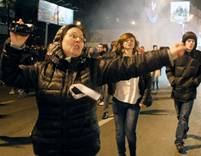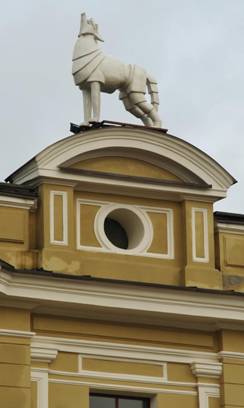
THE VOICE OF INTERNATIONAL LITHUANIA
|
VilNews has its own Google archive! Type a word in the above search box to find any article.
You can also follow us on Facebook. We have two different pages. Click to open and join.
|
Archive for 2011
- Posted by - (0) Comment
No people No problem: "The Baltic Tigers" false prophets of economic austerity

By Prof. Jeffrey Sommers and Prof. Arunas Juska and Prof. Michael Hudson
The Baltic states have discovered a new way to cut unemployment and cut budgets for social services: emigration. If enough people of working age are forced to leave to find work abroad, unemployment and social service budgets will both drop.
This simple mathematics explains what the algebra of austerity-plan advocates are applauding today as the “New Baltic Miracle” for Greece, Spain, and Italy to emulate. The reality, however, is a model predicated on economic shrinkage as a result of wage cuts. In the case of Latvia, this was some 30 percent for Latvian public-sector employees (euphemized as “internal devaluation”). With a set of flat taxes on employment adding up to 59% in Latvia (while property taxes are only 1%), it would seem hard indeed to present this as a success story.
But one hears only celebratory praise from the neoliberal lobbyists whose policies have de-industrialized and stripped the Baltic economies of Lithuania and Latvia, leaving them debt-ridden and uncompetitive. It is as if their real estate collapse from bubble-level debt leveraging that left their basic infrastructure in the hands of kleptocrats, is a free market success story.
What then does a neoliberal “free market” mean?
- Bookmark :
- Digg
- del.icio.us
- Stumbleupon
- Redit it
Russia’s once apolitical youth has taken to the streets of Moscow and launched the largest demonstrations since the collapse of the Soviet Union
- Posted by - (0) Comment
![]()

Demonstrators march in Moscow / AP
MOSCOW, Russia -- Shortly after seven on Tuesday evening, at the protest against the government of Prime Minister Vladimir Putin on Moscow's central Triumfal'naya Square, about a mile north of the Kremlin, protesters chanted, "Down with Putin!" "Putin Get Out!" "Russia Without Putin!" and, most ominously in a country where the only real leader is a strong leader, "Putin is a Coward!"
- Bookmark :
- Digg
- del.icio.us
- Stumbleupon
- Redit it
- Posted by - (0) Comment
Vilnius’ mayor cracks down on beggars and givers
Why are beggars despised?"A beggar, looked at realistically, is simply a |
 George Orwell |
By George Orwell
It is worth saying something about the social position of beggars, for when one has consorted with them, and found that they are ordinary human beings, one cannot help being struck by the curious attitude that society takes towards them. People seem to feel that there is some essential difference between beggars and ordinary "working" men. They are a race apart--outcasts, like criminals and prostitutes. Working men "work," beggars do not "work"; they are parasites, worthless in their very nature. It is taken for granted that a beggar does not "earn" his living, as a bricklayer or a literary critic "earns" his. He is a mere social excrescence, tolerated because we live in a humane age, but essentially despicable.
Yet if one looks closely one sees that there is no essential difference between a beggar's livelihood and that of numberless respectable people. Beggars do not work, it is said; but, then, what is work? A navvy works by swinging a pick. An accountant works by adding up figures. A beggar works by standing out of doors in all weathers and getting varicose veins, chronic bronchitis, etc. It is a trade like any other; quite useless, of course--but, then, many reputable trades are quite useless. And as a social type a beggar compares well with scores of others. He is honest compared with the sellers of most patent medicines, high-minded compared with a Sunday newspaper proprietor, amiable compared with a hire-purchase tout--in short, a parasite, but a fairly harmless parasite. He seldom extracts more than a bare living from the community, and, what should justify him according to our ethical ideas, he pays for it over and over in suffering. I do not think there is anything about a beggar that sets him in a different class from other people, or gives most modern men the right to despise him.
- Bookmark :
- Digg
- del.icio.us
- Stumbleupon
- Redit it
- Posted by - (1) Comment
Why are beggars despised?
"A beggar, looked at realistically, is simply a businessman, getting his living"

George Orwell (Eric Blair)
1903-1950
Best known for his novels Animal Farm (1945) and Nineteen Eighty-four (1949), George Orwell (pseudonym of Eric Arthur Blair) was one of the most notable political writers of his day. The following short piece has been drawn from Chapter 31 of Orwell's first book, Down and Out in Paris and London (1933), a semiautobiographical account of living in poverty in both cities. Though the word "beggars" is rarely heard nowadays, the "ordinary human beings" he describes are, of course, still with us.
By George Orwell
It is worth saying something about the social position of beggars, for when one has consorted with them, and found that they are ordinary human beings, one cannot help being struck by the curious attitude that society takes towards them. People seem to feel that there is some essential difference between beggars and ordinary "working" men. They are a race apart--outcasts, like criminals and prostitutes. Working men "work," beggars do not "work"; they are parasites, worthless in their very nature. It is taken for granted that a beggar does not "earn" his living, as a bricklayer or a literary critic "earns" his. He is a mere social excrescence, tolerated because we live in a humane age, but essentially despicable.
Yet if one looks closely one sees that there is noessential difference between a beggar's livelihood and that of numberless respectable people. Beggars do not work, it is said; but, then, what is work? A navvy works by swinging a pick. An accountant works by adding up figures. A beggar works by standing out of doors in all weathers and getting varicose veins, chronic bronchitis, etc. It is a trade like any other; quite useless, of course--but, then, many reputable trades are quite useless. And as a social type a beggar compares well with scores of others. He is honest compared with the sellers of most patent medicines, high-minded compared with a Sunday newspaper proprietor, amiable compared with a hire-purchase tout--in short, a parasite, but a fairly harmless parasite. He seldom extracts more than a bare living from the community, and, what should justify him according to our ethical ideas, he pays for it over and over in suffering. I do not think there is anything about a beggar that sets him in a different class from other people, or gives most modern men the right to despise him.
Then the question arises, Why are beggars despised?--for they are despised, universally. I believe it is for the simple reason that they fail to earn a decent living. In practice nobody cares whether work is useful or useless, productive or parasitic; the sole thing demanded is that it shall be profitable. In all the modem talk about energy, efficiency, social service and the rest of it, what meaning is there except "Get money, get it legally, and get a lot of it"? Money has become the grand test of virtue. By this test beggars fail, and for this they are despised. If one could earn even ten pounds a week at begging, it would become a respectable profession immediately. A beggar, looked at realistically, is simply a businessman, getting his living, like other businessmen, in the way that comes to hand. He has not, more than most modern people, sold his honor; he has merely made the mistake of choosing a trade at which it is impossible to grow rich.
(1933)
- Bookmark :
- Digg
- del.icio.us
- Stumbleupon
- Redit it
- Posted by - (2) Comment
The other dream team
New film about Lithuania’s 1992 basketball team
 The Other Dream Team is a documentary film directed by Marius A. Markevičius (picture). The inspirational story of the 1992 Lithuania national basketball team and their incredible journey from the clutches of Communism to the Summer Olympics in Barcelona. It stars many famous basketball persons like Yao Ming, Arvydas Sabonis, David Stern, Jim Lampley, Bill Walton, Šarūnas Marčiulionis, Paul Gasol and others. The film should be released in 2012.
The Other Dream Team is a documentary film directed by Marius A. Markevičius (picture). The inspirational story of the 1992 Lithuania national basketball team and their incredible journey from the clutches of Communism to the Summer Olympics in Barcelona. It stars many famous basketball persons like Yao Ming, Arvydas Sabonis, David Stern, Jim Lampley, Bill Walton, Šarūnas Marčiulionis, Paul Gasol and others. The film should be released in 2012.
When you hear the words "dream team" the names such as Michael Jordan, Magic Johnson, Scottie Pippen come to your mind. That's the squad of USA national team in Barcelona Olympic Games 1992. But that wasn't the only team in Barcelona which deserves the title "dream team". The other dream team was Lithuania.
The moment of Lithuania returning to the world's basketball family and instantly winning bronze in the Olympic Games was a unique moment in the history of basketball, memories of which brings NBC Sports Broadcaster Jim Lampley to tears. The full movie features many basketball legends such as Bill Walton, Šarūnas Marčiulionis and more.
TalkBasket.net presents you the trailer of the new documentary by Marius A. Markevičius called "The other dream team". Enjoy the video.
- Bookmark :
- Digg
- del.icio.us
- Stumbleupon
- Redit it
- Posted by - (0) Comment
Lithuania cracks down on beggars and almsgivers

ASSOCIATED PRESS: A coin tossed into a beggar's hat in Vilnius can be costly charity.
Lithuania's capital recently introduced a ban on panhandling that not only punishes those who beg but those who give, with fines of up to 2,000 litas ($770).
Outraged rights groups say the ban spells misery for the needy in one of Europe's poorest countries, as winter kicks in and economic turmoil spreads across the continent. Like other European Union nations, Lithuania has been implementing severe welfare cuts that promise to hit the homeless hard.
"Begging is a human right," said Linas Kukuraitis, director of the Lithuanian chapter of Catholic charity group Caritas. "It was there long before cities emerged. There have always been those who begged and those who helped them."
But Vilnius Mayor Arturas Zuokas says the ban will help beggars to find more sustainable ways to make a living.
"Giving money to people on the street is wrong," Zuokas said. "By doing this we doom them to stay there forever."
The ordinance took effect last week, but local police in Vilnius are not issuing fines just yet. Instead they are handing out cards to beggars with addresses and phone numbers of charities and homeless shelters. Stricter enforcement is expected to begin in January.
The mayor himself rode his bicycle on the cobblestone streets of the medieval city center on Sunday, looking for violators of the ban. Zuokas made a splash on YouTube earlier this year by riding an armored personnel carrier over a luxury car as a publicity stunt for his crackdown on illegal parking.
"You are doing the wrong thing by giving them money," Zuokas told a Polish tourist who dropped coins in an old man's hat. "If you really want to help them, it is better to give food or give to charity."
He said there are plenty of homeless shelters for the poor in Vilnius, "but they stay on the streets because it is a kind of business."
- Bookmark :
- Digg
- del.icio.us
- Stumbleupon
- Redit it
- Posted by - (0) Comment
Twenty years post Soviet
Confidence in democracy and capitalism wanes...

Two decades after the Soviet Union’s collapse, Russians, Ukrainians, and Lithuanians are unhappy with the direction of their countries and disillusioned with the state of their politics. Enthusiasm for democracy and capitalism has waned considerably over the past 20 years, and most believe the changes that have taken place since 1991 have had a negative impact on public morality, law and order, and standards of living.
There is a widespread perception that political and business elites have enjoyed the spoils of the last two decades, while average citizens have been left behind. Still, people in these three former Soviet republics have not turned their backs on democratic values; indeed, they embrace key features of democracy, such as a fair judiciary and free media. However, they do not believe their countries have fully developed these institutions.
- Bookmark :
- Digg
- del.icio.us
- Stumbleupon
- Redit it
Numerous warning lights – but who cares?
- Posted by - (0) Comment
We mention below three very distinct warning lights that Lithuanian authorities and control bodies should have reacted to long ago. These three are just the tip of the iceberg. There are many, many more...
WARNING LIGHT 1:

THE BRITISH FINANCIAL SERVICE USED STRONG WORDS ABOUT SNORAS BANK ALREADY 2 YEARS AGO
In 2009 the now nationalised Snoras bank applied to the British Financial Services Authority (FSA) to operate in the UK. The FSA refused permission to conduct business in the UK because the bank repeatedly gave “misleading and incomplete” answers to the regulator. These included failing to mention that it had been refused permission to take retail deposits in Russia and had been fined by the Lithuanian banking regulator. The FSA also attacked the record of Bankas Snoras’ largest shareholder and chairman of its supervisory board, Vladimir Antonov, whom it accused of withholding information. “These failures are not an isolated instance but are examples of an ongoing pattern of behaviour by institutions controlled by Mr Antonov,” the FSA said. These comments must have been known by the Lithuanian Central Bank (Lietuvos bankas) already by then. Why didn’t they react? And why didn’t Ernst & Young, Snoras’ auditor, react? The audit company is now conducting an internal investigation about its previous audits at the bank, but shouldn’t such an important investigation be done by a neutral party? We do, after all, talk about a scandal that will have a very negative impact for the economy of the country and its people…
Read more:
http://bnn-news.com/antonov-jailed-10-years-lithuania-3-years-latvia-41956
http://www.businessweek.com/news/2011-12-02/lithuania-borrowing-costs-to-surge-as-snoras-boosts-debt.html
WARNING LIGHT 2:
 The new Lithuanian parliament hall. |
 Irena Degutiene |
LITHUANIAN PARLIAMENTARIANS ARE AMONG THE BEST PAID IN THE ENTIRE EUROPEAN UNION!
BALTIC TIMES had an interesting article this week, telling that the Lithuanian parliamentarians’ 2,000 euro salary per month is at the bottom of the list of European legislator pay, but with all parliamentary allowances, benefits and salaries summed up, the entitlements skyrocket, catapulting Lithuanian legislators to a level with an average salary, on par with the very top of the best paid elected officials in the entire European Union, up to 10,000 euro per month!
“To be honest, I have never been aware of such benefits, even when I stayed at the wheel of the parliament. The Labor Party, whose deputy chairman I am now, stands for cutting down the excessive parliamentary benefits. However, I do not think this Seimas will have the guts to cut the fruitful branches it sits on,” Arturas Paulauskas, the former chairman of Naujoji Sajunga (New Union) and deputy chairman of the Labor Party presently, said to The Baltic Times.
The mid-November parliamentary deliberations over the draft on Parliamentarians’ Activity Guarantees have shown that Lithuanian legislators are far from considering any constraints on their lavish parliamentary incentives – the draft has been rejected and sent for improvements.
“I am really surprised by the legislators’ decision. Frankly, I thought the bill, upon introduction, with certain amendments and improvements would be passed. To reject it the way the parliamentarians did, walking out before the crucial vote or abstaining during the vote, means withdrawal from solving the problem. I do not know whether the politicians who voted against the bill, or simply walked out before the vote, will seek a new Seimas tenure next year. If yes, it means they are willing to further traipse in the mud we have all been stomping in so long and tediously,” Irena Degutiene, chairwoman of the Lithuanian Parliament, said with unusually strong words to express her angst.
Degutiene, nevertheless, is hopeful in bringing the revised and supplemented bill for the MPs in spring 2012. “I hope that common sense will prevail and we pass the law,” she said.
Unlike in Lithuania, in the other two Baltic countries MP salaries are recalculated every year, and politicians receive parliamentary activity compensation for transport, office, representation and professional training. In that regard, Estonia has set it such that this kind of compensation cannot exceed 30 percent of the parliamentary salary, which is 3,353 euros.
Read more:
http://www.baltictimes.com/news/articles/30094/
WARNING LIGHT 3:
 |
 |
LITHUANIA HAS NOW EU’S WIDEST WEALTH GAP AND HIGHEST POVERTY RISK
Lithuania’s austerity measures, which are similar in size to those facing Greece, boosted income inequality to the widest in the European Union.
The CHART OF THE DAY in a BLOOMBERG article this week shows how the proportion of people at risk of poverty in Lithuania surged to the highest level among the bloc’s 27 members after state spending was cut. The lower panel shows the gap between the nation’s highest and lowest earners is the EU’s widest after budget savings hurt the poor.
Lithuania implemented austerity measures equal to 12 percent of gross domestic product in 2009-2010. Pension cuts may be reversed after the economy grew 6.7 percent in the third quarter, the second-fastest pace in the EU. Greece, where GDP contracted 5.2 percent in the same period, is in the midst of budget cuts worth 16 percent of economic output, data from the International Monetary Fund show.
“The blow was very painful to the poor,” said Vilija Tauraite, an economist for SEB Bank in the capital, Vilnius. “Lithuania’s fiscal discipline has been extremely severe in the past three years and it’s now crucial to ease the burden because these people are hanging on the precipice of poverty. Their quality of life is far worse than the situation of pensioners in southern Europe.”
- Bookmark :
- Digg
- del.icio.us
- Stumbleupon
- Redit it
Numerous warning lights – but who cares?
- Posted by - (1) Comment
We mention below three very distinct warning lights that Lithuanian authorities and control bodies should have reacted to long ago. These three are just the tip of the iceberg. There are many, many more...
WARNING LIGHT 1:

THE BRITISH FINANCIAL SERVICE USED STRONG WORDS ABOUT SNORAS BANK ALREADY 2 YEARS AGO
In 2009 the now nationalised Snoras bank applied to the British Financial Services Authority (FSA) to operate in the UK. The FSA refused permission to conduct business in the UK because the bank repeatedly gave “misleading and incomplete” answers to the regulator. These included failing to mention that it had been refused permission to take retail deposits in Russia and had been fined by the Lithuanian banking regulator. The FSA also attacked the record of Bankas Snoras’ largest shareholder and chairman of its supervisory board, Vladimir Antonov, whom it accused of withholding information. “These failures are not an isolated instance but are examples of an ongoing pattern of behaviour by institutions controlled by Mr Antonov,” the FSA said. These comments must have been known by the Lithuanian Central Bank (Lietuvos bankas) already by then. Why didn’t they react? And why didn’t Ernst & Young, Snoras’ auditor, react? The audit company is now conducting an internal investigation about its previous audits at the bank, but shouldn’t such an important investigation be done by a neutral party? We do, after all, talk about a scandal that will have a very negative impact for the economy of the country and its people…
Read more:
http://bnn-news.com/antonov-jailed-10-years-lithuania-3-years-latvia-41956
http://www.businessweek.com/news/2011-12-02/lithuania-borrowing-costs-to-surge-as-snoras-boosts-debt.html
WARNING LIGHT 2:
 The new Lithuanian parliament hall. |
 Irena Degutiene |
LITHUANIAN PARLIAMENTARIANS ARE AMONG THE BEST PAID IN THE ENTIRE EUROPEAN UNION!
BALTIC TIMES had an interesting article this week, telling that the Lithuanian parliamentarians’ 2,000 euro salary per month is at the bottom of the list of European legislator pay, but with all parliamentary allowances, benefits and salaries summed up, the entitlements skyrocket, catapulting Lithuanian legislators to a level with an average salary, on par with the very top of the best paid elected officials in the entire European Union, up to 10,000 euro per month!
“To be honest, I have never been aware of such benefits, even when I stayed at the wheel of the parliament. The Labor Party, whose deputy chairman I am now, stands for cutting down the excessive parliamentary benefits. However, I do not think this Seimas will have the guts to cut the fruitful branches it sits on,” Arturas Paulauskas, the former chairman of Naujoji Sajunga (New Union) and deputy chairman of the Labor Party presently, said to The Baltic Times.
The mid-November parliamentary deliberations over the draft on Parliamentarians’ Activity Guarantees have shown that Lithuanian legislators are far from considering any constraints on their lavish parliamentary incentives – the draft has been rejected and sent for improvements.
“I am really surprised by the legislators’ decision. Frankly, I thought the bill, upon introduction, with certain amendments and improvements would be passed. To reject it the way the parliamentarians did, walking out before the crucial vote or abstaining during the vote, means withdrawal from solving the problem. I do not know whether the politicians who voted against the bill, or simply walked out before the vote, will seek a new Seimas tenure next year. If yes, it means they are willing to further traipse in the mud we have all been stomping in so long and tediously,” Irena Degutiene, chairwoman of the Lithuanian Parliament, said with unusually strong words to express her angst.
Degutiene, nevertheless, is hopeful in bringing the revised and supplemented bill for the MPs in spring 2012. “I hope that common sense will prevail and we pass the law,” she said.
Unlike in Lithuania, in the other two Baltic countries MP salaries are recalculated every year, and politicians receive parliamentary activity compensation for transport, office, representation and professional training. In that regard, Estonia has set it such that this kind of compensation cannot exceed 30 percent of the parliamentary salary, which is 3,353 euros.
Read more:
http://www.baltictimes.com/news/articles/30094/
WARNING LIGHT 3:
 |
 |
LITHUANIA HAS NOW EU’S WIDEST WEALTH GAP AND HIGHEST POVERTY RISK
Lithuania’s austerity measures, which are similar in size to those facing Greece, boosted income inequality to the widest in the European Union.
The CHART OF THE DAY in a BLOOMBERG article this week shows how the proportion of people at risk of poverty in Lithuania surged to the highest level among the bloc’s 27 members after state spending was cut. The lower panel shows the gap between the nation’s highest and lowest earners is the EU’s widest after budget savings hurt the poor.
Lithuania implemented austerity measures equal to 12 percent of gross domestic product in 2009-2010. Pension cuts may be reversed after the economy grew 6.7 percent in the third quarter, the second-fastest pace in the EU. Greece, where GDP contracted 5.2 percent in the same period, is in the midst of budget cuts worth 16 percent of economic output, data from the International Monetary Fund show.
“The blow was very painful to the poor,” said Vilija Tauraite, an economist for SEB Bank in the capital, Vilnius. “Lithuania’s fiscal discipline has been extremely severe in the past three years and it’s now crucial to ease the burden because these people are hanging on the precipice of poverty. Their quality of life is far worse than the situation of pensioners in southern Europe.”
- Bookmark :
- Digg
- del.icio.us
- Stumbleupon
- Redit it
- Posted by - (0) Comment
Land of smiles or tears?

In a recent issue of VilNews I wrote that I do not share the pessimists gloomy predictions for the world's future, as I think the crisis is part of a necessary cleansing process. I am optimistic because I see that a whole new type of people is coming. New leaders. Many of today's children and young people.
What I see is forward-looking youngsters with good balance within themselves and their 'other dimension'; their divine origin.
I believe that ‘The land of smiles’ is under development. That new kids, a new human type, seem to have come to Earth with a special mission: to assist the Earth and its inhabitants in the transition and the 'rebirth' as a planet with higher awareness and better interpersonal understanding.
Aage Myhre
Editor-in-Chief
Go to Section 5 to read more…
You are all welcome to participate in the discussion!
- Bookmark :
- Digg
- del.icio.us
- Stumbleupon
- Redit it
Many believe that we will be entering the Age of Enlightenment within the next five years… Others believe that we have already begun to make this transition
- Posted by - (0) Comment
![]()

Jurate Kutkus Burns
This week in the Friday News Minute we look at Conscious Leadership in article from Lisa Berg, a colleague and friend, and President of Global Bridge Productions. Lisa’s article highlights an important part of our workplace transference from the Information Age to the Age of Consciousness, also called the Age of Enlightenment. Many believe that we will be entering this next evolutionary stage within the next five years…others believe that we have already begun to make this transition.
The time has come for us to move past the illusion of separateness
Conscious leadership calls for inclusivity, multidimensionality, intergenerational and interdisciplinary focus and common experience that goes beyond boundaries of rank, belief systems or nationality and touches the core of who we are.
What can we do to reach this level of inner and outer harmony that comes through collective efforts rather than conflict? What do wisdom traditions offer that is relevant in our modern world?
Listen from the heart to what has meaning and lead from there. As a cross-cultural consultant I work with hundreds of corporate employees working internationally.
Rather than judge one another, we teach our clients to go beneath the surface of a behavior that differed from their own to find deeper meaning. This led to under-standing and acceptance, more productive negotiations and perhaps even a shared knowing.
For example, when a Japanese business man is silent, it is wise to note that the Japanese listen to the ‘hara’, the belly, for information rather than use superfluous words and explanations. Not rushing into an answer is wise. We can learn from each other, if we take the time to slow down enough to listen.
Appreciate what I call the Three Points of Connection: Nature, Humanity and Universal Wisdom. In the beautiful rice fields of Bali, Indonesia stands a shrine. The farmer is reminded of his connection to his fellow human beings, to Nature and to the Spirit world. The Balinese give offerings throughout the day to the Gods. The peacefulness in the air is palpable. There is a feeling of generosity and oneness. And lots of smiling.
When leaders and citizens remember to appreciate the Three Points of Connection, everything else will fall into place. We will know, from deep within, that to care for our environment is not only a privilege but natural because as we care for the earth we care for ourselves. We will know that going beyond boundaries of difference and age-old conflict enables us to make peace with our neighbors and co-create a world where children live happily and healthfully. And, when we return to source as the partner in creating our world, we will not falter in our ability to move towards a positive future that is inclusive of all sentient beings, as the great mystical traditions teach.
Creating a harmonious and inclusive future takes a village.
Gather small groups in your organization and begin to listen deeply to each other. Better yet, take a walk outside and commune with Nature. Give thanks for the beauty that surrounds you and take time to smell the roses. All things will go smoother from there.
Jurate Kutkus Burns,
Florida.
- Bookmark :
- Digg
- del.icio.us
- Stumbleupon
- Redit it
New flights between Moscow and Vilnius
- Posted by - (0) Comment
![]()

Transaero Airlines will operate its flights to Vilnius Airport with Boeing 737-500 aircrafts.
More and more people fly between Russia and Lithuania, and now there will be more seats and new flights.
New Russian flights from Vilnius to Domodedovo Airport are scheduled four times a week – on Mondays, Thursdays, Saturdays and Sundays. The flight duration to Moscow is 1 hour 40 min.
Initially Transaero Airlines will operate its flights to Vilnius Airport with Boeing 737-500 aircrafts providing passengers with a choice of three classes: Business class, Premium Economy and Tourist Economy.
Transaero Airlines is the first and currently the largest private carrier in Russia. Transaero’s fleet consists of 73 aircrafts. According to the German Jet Airliner Crash Data Evaluation Center (JACDEC), the company ranked in the top 10 safest carriers among the world's 60 largest airlines. Transaero serves 116 routes in Russia, Europe, Asia, Africa and America.
- Bookmark :
- Digg
- del.icio.us
- Stumbleupon
- Redit it
- Posted by - (0) Comment
A new Iron Wolf
howling over Vilnius

Vilnius’ new Iron Wolf, on top of a nicely renovated building within the Vilnius Railway Station area.
K.Slade/A.Myhre.
There is a legend that surrounds the founding of Vilnius in 1323. The legend has it that Grand Duke Gediminas went on a hunting trip in the holy woods of the Valley of Sventaragis. Tired after a successful day of hunting, the Grand Duke settled for the night near a hill at the convergence of the Neris and Vilnia rivers. He fell asleep soundly and had a dream. A huge iron wolf was standing on top of the hill and the sound of hundreds of other wolves inside it filled all the surrounding fields and woods. After the hunting trip, Gediminas went back to Trakai (the capital of Lithuania at that time) and consulted the pagan priest (oracle), Lizdeika, to reveal the secrets behind the dream. And the priest told him: “What is destined for the ruler and the state of Lithuania, let it be: The iron wolf means a formidable castle and town which will be established by the ruler on this site. The city will stand as strong as iron and its walls will protect the land from its enemies. The massive sound dwelled inside the wolf, symbolized the fame of the city shall echo beyond their borders and proclaim throughout the centuries the glory of Lithuania.” Gediminas heeded and pleased with the priest’s reveal of his dream. He begin to summon artisans and craftsmen around the country and Europe to design and construct his new strong and beautiful kingdom, which would surround this hill where he had the dream of the iron wolf. Upon the completion Gediminas moved his home, signaling the establishment of a new capital for his country: Vilnius.
- Bookmark :
- Digg
- del.icio.us
- Stumbleupon
- Redit it
VilNews e-magazine is published in Vilnius, Lithuania. Editor-in-Chief: Mr. Aage Myhre. Inquires to the editors: editor@VilNews.com.
Code of Ethics: See Section 2 – about VilNews. VilNews is not responsible for content on external links/web pages.
HOW TO ADVERTISE IN VILNEWS.
All content is copyrighted © 2011. UAB ‘VilNews’.

 Click on the buttons to open and read each of VilNews' 18 sub-sections
Click on the buttons to open and read each of VilNews' 18 sub-sections 
















.jpg)



